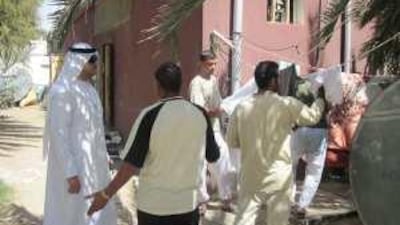AL AIN // A metre away from Hamam Alawi, an irate man is brandishing a large knife. Mr Alawi holds his ground, even as the man moves in, shouting and waving the weapon. Mr Alawi is not intimidated, because he has the law on his side. He is the laundry inspector.
This is not the first time that Mr Alawi, a 31-year-old Syrian health inspector with Al Ain Municipality, who was born and raised in the city, has visited the house. Last week, he warned the occupants - one of whom is now wielding the blade - that hanging out their laundry to dry in public view was unsightly and illegal. This time there is no warning. The clothesline is to be cut down and the man with the knife is to be referred to the Municipality Prosecutor's Office for hanging out his laundry.
Despite the armed man's protestations, the health inspector is insistent. The man will be fined. He should be pleased, says Mr Alawi, that his clothes were not confiscated. The man turns away from the inspector, and uses the knife to cut down the offending clothesline. "This is unfair," he said. "I was never warned about this before and didn't know. Give me a warning at least this time." In the front of the house, litter is strewn across broken furniture and there is a disassembled bed. A chicken and a rooster strut amid hundreds of cigarette butts.
"I had warned the occupants of this house about the mess and about the laundry twice in the past two months, but my warnings were ignored," Mr Alawi says. "I don't feel bad about issuing the citation, especially when he and I know that he's lying." Mr Alawi takes the man's identity card and orders him to collect it from the Municipality Prosecutor's Office, where a court date will be set for him to explain his slovenliness to a municipal judge. If he is found guilty, he will be fined.
Mr Alawi tells him: "We are doing this to make the area more beautiful for you." The municipality's five-day campaign to keep residents from hanging their laundry in public in the central district came to a temporary halt on Thursday. Forty-seven people have been referred for prosecution. "For three months, my inspectors have been going door-to-door, distributing brochures to residents and posting signs in residential buildings advising residents to not hang out their laundry where everybody can see it," says Salem Khalfan al Kaabi, the manager of the public health department. "It was now time to act."
Mr al Kaabi has dedicated 15 inspectors - 10 per cent of his staff - to the laundry patrol, in what he called an "aggressive campaign". Determined to eradicate the scourge of unsightly laundry being displayed in public, he has plans to require those seeking building permits to incorporate a laundry facility into their designs before a permit is issued. "The most common thing we hear from violators of the laundry law is that they don't have anywhere to hang their clothes other than outside in the sun," he says.
"If each building was to have a dryer, that would help solve the problem." That is the reason Sharaf Aziz, 35, a driver from Afghanistan, gives when he finds Mr Alawi at his door, demanding that all the male occupants step out of the house with their identification. Through the open door, a number of bunk beds can be seen inside, surrounding a small cooker in a room shared by six Afghan men. "Look inside, there is nowhere we can put the clothes to dry," says Mr Aziz. "What can we do?"
Mr Alawi suggests that they dry their clothes on the roof and make sure the clothesline is out of sight. As the men take their washing inside, Mr Alawi issues Mr Aziz with a written warning. Here, too, the offending line is cut down, and mounts broken. At another house, a Filipina is standing outside with laundry in her hands that she is about to hang. She sees Mr Alawi approaching with his municipality badge in plain view, and scuttles back inside.
Mr Alawi decides not to knock, but is clear that it would be within his rights. "We, as inspectors, can only knock on the door and order people to come out," he says. "If we hear someone inside and they refuse to open the door we cannot enter unless we have a warrant - which we can get in cases like this. "What we can also do is come back later, or right there and then cut down the clothesline and confiscate the clothes." With that he moves on, looking out for the next laundry offender. @Email:ealghalib@thenational.ae

